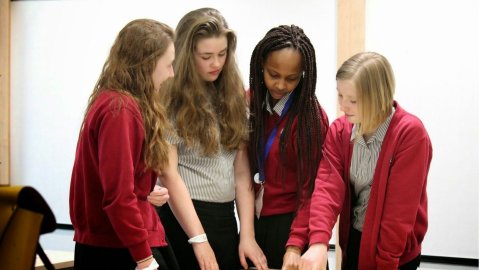15:00
15:00
"Resonance" from the textbook in preparation, "Exploring ODEs"
Global well-posedness of the energy critical Maxwell-Klein-Gordon equation
Abstract
The massless Maxwell-Klein-Gordon system describes the interaction between an electromagnetic field (Maxwell) and a charged massless scalar field (massless Klein-Gordon, or wave). In this talk, I will present a recent proof, joint with D. Tataru, of global well-posedness and scattering of this system for arbitrary finite energy data in the (4+1)-dimensional Minkowski space, in which the PDE is energy critical.
Biaxiality in liquid crystals at low temperatures (Please note Week 9)
Abstract
We study the low-temperature limit in the Landau-de Gennes theory for liquid crystals. We prove that for minimizers for orientable Dirichlet data tend to be almost uniaxial but necessarily contain some biaxiality around the singularities of a limiting harmonic map. In particular we prove that around each defect there must necessarily exist a maximal biaxiality point, a point with a purely uniaxial configuration with a positive order parameter, and a point with a purely uniaxial configuration with a negative order parameter. Estimates for the size of the biaxial cores are also given.
This is joint work with Apala Majumdar and Adriano Pisante.
Macroscopic transport: ballistic, diffusive, super diffusive
Abstract
In acoustic materials (non null sound velocity), there is a clear separation of scale between the relaxation to mechanical equilibrium, governed by Euler equations, and the slower relaxation to thermal equilibrium, governed by heat equation if thermal conductivity is finite. In one dimension in acoustic systems, thermal conductivity is diverging and the thermal equilibrium is reached by a superdiffusion governed by a fractional heat equation. In non-acoustic materials it seems that there is not such separation of scales, and thermal and mechanical equilibriums are reached at the same time scale, governed by a Euler-Bernoulli beam equation. We prove such macroscopic behaviors in chains of oscillators with dynamics perturbed by a random local exchange of momentum, such that energy and momentum are conserved. (Works in collaborations with T. Komorowski).
The Grothendieck-Riemann-Roch theorem and the Frobenius morphism
Abstract
Let p>0 be a prime number. We shall describe a short Frobenius-theoretic proof of the Adams-Riemann-Roch theorem for the p-th Adams operation, when the involved schemes live in characteristic p and the morphism is smooth. This result implies the Grothendieck-Riemann-Roch theorem for smooth morphisms in positive characteristic and the Hirzebruch-Riemann-Roch theorem in any characteristic. This is joint work with R. Pink.


